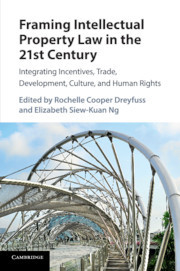Description
Framing Intellectual Property Law in the 21st Century
Integrating Incentives, Trade, Development, Culture, and Human Rights
Coordinators: Dreyfuss Rochelle Cooper, Ng Elizabeth Siew-Kuan
The book describes how intellectual property law is framed by theories about incentives, trade, health, development, and human rights.
Language: English
Subject for Framing Intellectual Property Law in the 21st Century:
Framing Intellectual Property Law in the 21st Century
Publication date: 10-2019
Support: Print on demand
Publication date: 10-2019
Support: Print on demand
Framing Intellectual Property Law in the 21st Century
Publication date: 10-2018
368 p. · 15.7x23.5 cm · Hardback
Publication date: 10-2018
368 p. · 15.7x23.5 cm · Hardback
Description
/li>Contents
/li>Biography
/li>
As knowledge production has become a more salient part of the economy, intellectual property laws have expanded. From a backwater of specialists in patent, copyright, and trademark law, intellectual property has become linked to trade through successive international agreements, and appreciated as key to both economic and cultural development. Furthermore, law has begun to engage the interest of economists, political theorists, and human rights advocates. However, because each discipline sees intellectual property in its own way, legal scholarship and practice have diverged, and the debate over intellectual property law has become fragmented. This book is aimed at bringing this diverse scholarship and practice together. It examines intellectual property through successive lenses (incentive theory, trade, development, culture, and human rights) and ends with a discussion of whether and how these fragmented views can be reconciled and integrated.
Preface; 1. In praise of an incentive-based theory of intellectual property protection Rochelle Cooper Dreyfuss; 2. Copyright and creative incentives: what do(n't) we know? Christopher Sprigman; 3. Reframing intellectual property rights with fewer distortions of the trade paradigm Jerome H. Reichman; 4. The fusion of intellectual property and trade Susy Frankel; 5. Flexibilities in the implementation of TRIPS: an analysis of their impact on technological innovation and public health in Asia Elizabeth Siew-Kuan Ng and Albert Guangzhou Hu; 6. Image rights and other unorthodox forms of intellectual property Megan Richardson and Julian Thomas; 7. Taking the Mickey out of Disney: a cultural approach to the transformative use doctrine in copyright law David Tan; 8. Authors' human rights in the intellectual property framework Graeme W. Austin; 9. Intellectual property in the image of human rights: a critical review Ruth L. Okediji; 10. Framing the international intellectual property system Graeme Dinwoodie and Annette Kur; Commentary: framing intellectual property law in the twenty-first century: a policy practitioner's perspective Yih-San Tan and Sandra Yu; Commentary on Chapter 1: 'In praise of an incentive-based theory of intellectual property protection' Mark Lim Fung-Chian; Commentary on Chapter 6: 'Image rights and other unorthodox forms of intellectual property' Wee Loon Ng-Loy; Index.
Rochelle Cooper Dreyfuss is the Pauline Newman Professor of Law at New York University School of Law and co-Director of its Engelberg Center on Innovation Law and Policy. She is a member of the American Law Institute and was a co-Reporter for its Project on Intellectual Property: Principles Governing Jurisdiction, Choice of Law, and Judgments in Transnational Disputes. She was a consultant to the Federal Courts Study Committee, to the Presidential Commission on Catastrophic Nuclear Accidents, and to the Federal Trade Commission, and has served on the Secretary of Health and Human Services' Advisory Committee on Genetics, Health, and Society.
Elizabeth Siew-Kuan Ng was the Vice-Chairwoman and Director of the Intellectual Property Unit of the EW Barker Centre for Law and Business, and associate professor of law at the National University of Singapore. She served as an Intellectual Property Adjudicator at the Intellectual Property Office of Singapore and as amicus curiae for the Supreme Court of Singapore. In her specialised area of patents, she was retained as a consultant by the World Intellectual Property Organization in Geneva to report on the impact of the patent regime on developing countries.
Elizabeth Siew-Kuan Ng was the Vice-Chairwoman and Director of the Intellectual Property Unit of the EW Barker Centre for Law and Business, and associate professor of law at the National University of Singapore. She served as an Intellectual Property Adjudicator at the Intellectual Property Office of Singapore and as amicus curiae for the Supreme Court of Singapore. In her specialised area of patents, she was retained as a consultant by the World Intellectual Property Organization in Geneva to report on the impact of the patent regime on developing countries.
© 2024 LAVOISIER S.A.S.




